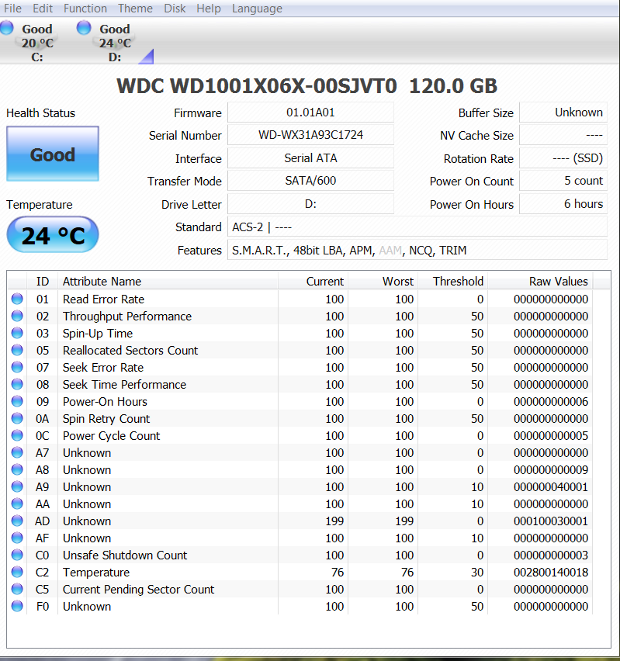SSD ONLY BENCHMARKS
This next set of benchmarks represents testing of the WD 120GB SSD by itself. It is designated by the system as drive letter C: in all of the applicable screenshots.
Crystal Disk Info shows a healthy 120GB drive with S.M.A.R.T. and TRIM highlighted, indicating that they are enabled.
Even with transfer sizes as small as 4KB, the SSD’s write speeds plateau in the 145-147 MB/s range. All transfers at sizes above 4KB are in the same range. This pretty much shows us the maximum write speed the SSD portion is capable of. As far as reads, at transfer sizes of 256KB and larger, the speeds peak in the 425-427 MB/s range. At a transfer size of 4096KB, the read speeds jump clear up to over 461 MB/s.
CRYSTAL DISK BENCHMARK VER. 3.0×64
Crystal Disk Mark shows us that the SSD portion of the WD Black2 appears to handle compressed or uncompressed data almost equally. All test categories show very little variation. Zero-fill (compressible) results are shown on the left, and random (incompressible) are shown on the right.
AS SSD’s “worst case scenario” speeds show the SSD portion attaining read speeds of just over 400 MB/s, and write speeds below 140 MB/s. When we look at the IOPS screen we see random 4K-64 thread read speeds of over 51,000 IOPS, and write speeds of just over 30,000 IOPS — not bad for a 120GB SSD. Again, MB/s are shown on the left, and IOPS are shown on the right.
With AS SSD’s copy benchmark test, the SSD portion of the WD Black2 shows mediocre results at best.
ANVIL STORAGE UTILITES PROFESSIONAL
Even set at “zero fill”, the Anvil results for the SSD are rather disappointing. Maximum read speeds are under 400 MB/s, and writes below 140 MB/s. The total score of 2603.65 puts it way down the charts as compared to other SSDs.
The SSD Review uses benchmark software PCMark Vantage x64 HDD Suite to create testing scenarios that might be used in the typical user experience. There are eight tests in all and the tests performed record the speed of data movement in MB/s, to which they are given a numerical score after all of the tests are complete. The simulations are as follows:
* Windows Defender In Use
* Streaming Data from storage in games such as Alien Wake which allows for massive worlds and riveting non-stop action.
* Importing digital photos into Windows Photo Gallery
* Starting the Vista Operating System
* Home Video editing with Movie Maker which can be very time consuming
* Media Center which can handle video recording, time shifting and streaming from Windows media center to an extender such as XBox
* Cataloging a music library
* Starting applications
The SSD portion of the WD Black2’s PCMark Vantage score of 44590 is also rather low in comparison to other comparable SSDs. The significantly lower write speeds are dragging down the overall score in several of our benchmarks.
 The SSD Review The Worlds Dedicated SSD Education and Review Resource |
The SSD Review The Worlds Dedicated SSD Education and Review Resource | 


I’m no much of a laptop person and i think it wont do me any good since i use mine for work(not on desk) and its constantly moving, and hdds parts are kind a risky, so 100% SSDs for laptops or any mobile device. But i wike to see bigger HDD for work at home ! Very helpful review !
the NAND is known to be 20nm but you don’t know the vendor? how is that? technically Sandisk and Tosh do not have 20nm process.
The memory is not marked and the manufacturer didn’t provide the information at the time of the report. We don’t guess.
I bought one of these and have installed it with programs on SSD and data on the 1TB HDD.
I find the 1TB HDD slow to respond to document opening etc. I would have preferred a 7,200 rpm HDD connected to the SSD
Being a pure SSD lover, I can’t say as I blame you.
Love this product… Installed it 6 months ago and it made my 3 year old laptop respond faster than my friends 2015 gaming laptops (with sshd in it). Money well spent.